Podcast Topic: Equity, Race & Food Justice
The Leading Voices in Food
Podcast Topic: Equity, Race & Food Justice
 E157: Adam Zipkin on Transitioning to an Agricultural System that Benefits Everyone
E157: Adam Zipkin on Transitioning to an Agricultural System that Benefits Everyone
February 17, 2022
Today, we’re going to explore industrial agriculture and what that means to farmers and ranchers, to farm workers, to corporations, and consumers. Our guest today, Adam Zipkin, serves as council to New Jersey Senator, Cory Booker. He advises Senator Booker on issues related to food policy, agriculture, and animal welfare. Booker has been deeply engaged in legislation such as the Farm System Reform Act, Black Farmers Act, and the Climate Stewardship Act.
Related podcasts: Agriculture & Tech | Community & Economic Development | Equity, Race & Food Justice | Food Insecurity | Food Policy | Regenerative Agriculture | Urban Agriculture |
 E151: MAZON’s support for Indian Food Sovereignty, Puerto Rico, and Quick Response Food Advocacy
E151: MAZON’s support for Indian Food Sovereignty, Puerto Rico, and Quick Response Food Advocacy
December 16, 2021
We’re speaking today with Mia Hubbard, vice president of programs at MAZON, a Jewish response to hunger, which is a national advocacy organization working to end hunger among people of all phase and backgrounds in the United States and in Israel. This is the fifth and final episode in our series partnership with MAZON. This time we will focus on the organization’s work to increase access to nutritious foods in the charitable food network.
Related podcasts: Advocacy & Food | COVID-19 Pandemic Impacts on Food | Equity, Race & Food Justice | First Nations Food Issues | Food Insecurity |
 E145: A Strategy to Improve SNAP Impact Through the Next Farm Bill
E145: A Strategy to Improve SNAP Impact Through the Next Farm Bill
October 12, 2021
In 2023, the U.S. will reauthorize the Supplemental Nutrition Assistance Program, known as SNAP, as part of the massive Farm Bill. In the aftermath of the COVID-19 lockdowns and unprecedented innovations to SNAP benefits and delivery, what should the future program look like? As one of the country’s most important social safety nets, SNAP is a proven policy for stabilizing the economy, lifting Americans out of poverty, reducing food insecurity, and improving health while also reducing healthcare costs. In anticipation of this reauthorization, the Robert Wood Johnson Foundation’s Healthy Eating Research Program published a new report entitled “Strengthening the Public Health Impacts of SNAP: Key Opportunities for the Next Farm Bill.” The report identified the evidence-based changes that have the greatest potential to improve SNAP participants’ nutrition and their overall health. And the stakes on this are really high because the lives of so many people are affected. Today, we’ll be talking with Duke University’s Megan Lott, deputy director of the Robert Wood Johnson Foundation’s Healthy Eating Research Program, and coauthor Catherine Woteki, former under secretary for the USDA’s Research, Education, and Economics mission areas, who is now on the faculty of Iowa State University and at the University of Virginia, and she’s also the president of the Charles Valentine Riley Memorial Foundation.
Related podcasts: Advocacy & Food | Child Development & Nutrition | COVID-19 Pandemic Impacts on Food | Equity, Race & Food Justice | Food Insecurity | Food Policy | Social Safety Net & Food |
 E139: MAZON’s Tipping Point – Driving Nutrition in the Food Bank Safety Net
E139: MAZON’s Tipping Point – Driving Nutrition in the Food Bank Safety Net
September 2, 2021
This podcast focuses on why now is the right time to fix the US food system. I’m talking today with Marla Feldman, Senior Program Director at MAZON: A Jewish Response to Hunger, which is a national advocacy organization working to end hunger among people of all faiths and backgrounds, in both the United States and Israel. As our regular listeners will know from previous podcasts, for 36 years, MAZON has worked towards systemic change to address hunger and its root causes. This is done through a combination of initiatives, including programs with low-income populations or problems that have previously been overlooked or ignored, including food insecurity among currently serving military families, among veterans, single mothers, Native Americans, LGBTQ seniors, and the people of Puerto Rico and the territories. This is the fourth in our series of episodes in partnership with MAZON. And this time, we’ll focus on the organization’s work to increase access to nutritious foods in the charitable food network.
Related podcasts: Advocacy & Food | Equity, Race & Food Justice | Food Insecurity | Philanthropy & Food Systems |
 E137: Why Grocery Taxes Hurt Low Income Families More – Evidence for Policymakers
E137: Why Grocery Taxes Hurt Low Income Families More – Evidence for Policymakers
August 25, 2021
Taxes fund many important services, such as education, transportation, parks, and healthcare that benefit us all and our society. But does it make sense to tax groceries? Today, we’re exploring research on the impact of grocery taxes, particularly, on low income families. We have two guests today who have collaborated on a really interesting project. Agricultural economist, Yuqing Zheng, of the University of Kentucky, and Norbert Wilson of Duke University. They’re co-authors on a research paper entitled Putting Grocery Taxes on the Table, Evidence for Food Security Policy Makers.
Related podcasts: Equity, Race & Food Justice | Food Insecurity | Food Policy |
 E132: Connecting Food with our Environment in Daily Life
E132: Connecting Food with our Environment in Daily Life
June 16, 2021
Most people think about the connection between food and their budget, or food and their health, but more and more people are concerned about the connection between food and the environment. Someone who cares about this a great deal is food campaigner, Jennifer Molidor, from the Center for Biological Diversity.
Related podcasts: Climate Change, Environment & Food | Equity, Race & Food Justice | Food Waste & Implications |
 E130: Can Software Help Cities Solve Food Insecurity?
E130: Can Software Help Cities Solve Food Insecurity?
May 27, 2021
Can software help urban planners tackle food access in big cities? The UrbanFootprint organization says yes. Fast Company named it one of the most innovative social good companies in 2021. Our guest today is the company’s co-founder and CEO, Joe DiStefano. He’s going to explain how city data and geospatial information can inform critical planning decisions about where to invest and to deploy resources to achieve urban food system resilience and to better support communities.
Related podcasts: Community & Economic Development | Diet & Nutrition | Equity, Race & Food Justice | Food Insecurity | Social Safety Net & Food |
 E127: Paarlberg Tackles Misinformation about Food We Grow and Eat
E127: Paarlberg Tackles Misinformation about Food We Grow and Eat
May 5, 2021
Today’s guest, Dr. Robert Paarlberg, is the author of a provocative new book entitled: Resetting the Table: Straight Talk About the Food We Grow and Eat. The book is presented as a clear-eye, science-based corrective, to misinformation about our food: how it’s produced, food companies, nutrition labeling, ethical treatment of animals, the environmental impact of agriculture, and even more.
Related podcasts: Advocacy & Food | Agriculture & Tech | Antibiotic Resistance | Community & Economic Development | Diet & Nutrition | Equity, Race & Food Justice | Food Insecurity | Food Policy | History & Food | Obesity |
 E125: Women, Food Insecurity and the Feminization of Poverty in the US
E125: Women, Food Insecurity and the Feminization of Poverty in the US
April 14, 2021
Hunger affects all communities, but you may not know that 40% of single mothers struggle with food security. Women dominate our central workforce, yet they face persistent structural barriers to food security and economic stability. COVID-19 has only exacerbated these challenges. Today, Abby J. Leibman, President and CEO of MAZON: A Jewish Response to Hunger, discusses the urgent and unique needs single mothers face, and the work she’s leading to advance the anti-hunger movement.
Related podcasts: Advocacy & Food | Child Development & Nutrition | Equity, Race & Food Justice | Food Insecurity | Food Policy |
 E123: Rashid Nuri and a Vision for Urban Agriculture
E123: Rashid Nuri and a Vision for Urban Agriculture
April 6, 2021
The term urban agriculture is becoming more familiar, but relatively few people know how this works on the ground in real world settings, and can fully appreciate the promise it has for the future. Our guest, Rashid Nuri, is the ideal person to explain. In 2006, Nuri founded the Truly Living Well Center in Atlanta to realize a vision for community food, sovereignty, and equity. This urban Ag organization grows tons of chemical-free, nutritious food, provides jobs, and works to educate communities.
Related podcasts: Advocacy & Food | Agriculture & Tech | Equity, Race & Food Justice | Food Insecurity | Food Policy | Urban Agriculture | Voice of Farming |

 E157: Adam Zipkin on Transitioning to an Agricultural System that Benefits Everyone
E157: Adam Zipkin on Transitioning to an Agricultural System that Benefits Everyone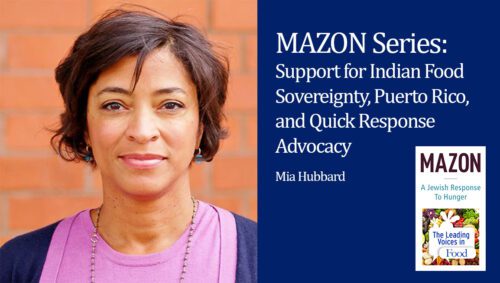 E151: MAZON’s support for Indian Food Sovereignty, Puerto Rico, and Quick Response Food Advocacy
E151: MAZON’s support for Indian Food Sovereignty, Puerto Rico, and Quick Response Food Advocacy E145: A Strategy to Improve SNAP Impact Through the Next Farm Bill
E145: A Strategy to Improve SNAP Impact Through the Next Farm Bill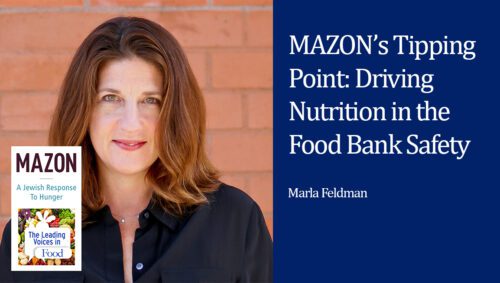 E139: MAZON’s Tipping Point – Driving Nutrition in the Food Bank Safety Net
E139: MAZON’s Tipping Point – Driving Nutrition in the Food Bank Safety Net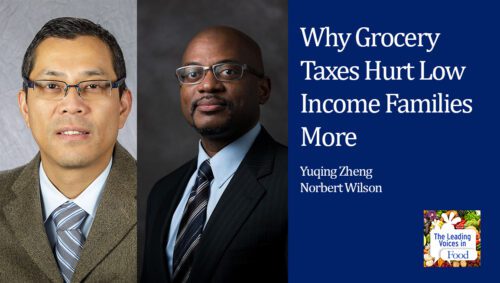 E137: Why Grocery Taxes Hurt Low Income Families More – Evidence for Policymakers
E137: Why Grocery Taxes Hurt Low Income Families More – Evidence for Policymakers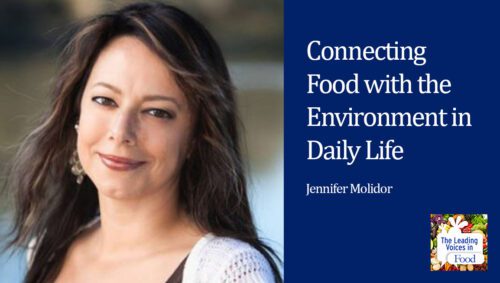 E132: Connecting Food with our Environment in Daily Life
E132: Connecting Food with our Environment in Daily Life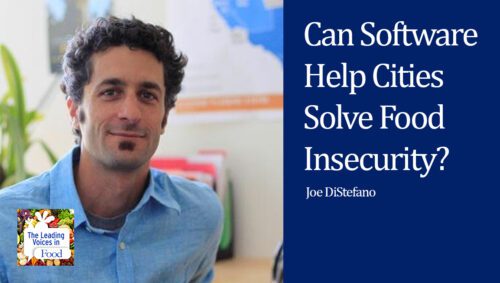 E130: Can Software Help Cities Solve Food Insecurity?
E130: Can Software Help Cities Solve Food Insecurity?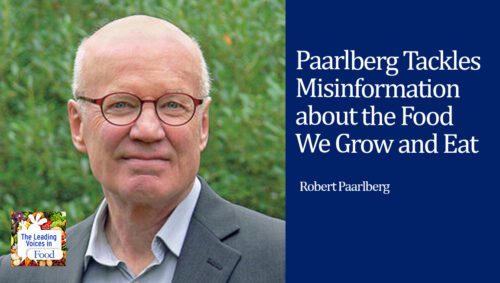 E127: Paarlberg Tackles Misinformation about Food We Grow and Eat
E127: Paarlberg Tackles Misinformation about Food We Grow and Eat E125: Women, Food Insecurity and the Feminization of Poverty in the US
E125: Women, Food Insecurity and the Feminization of Poverty in the US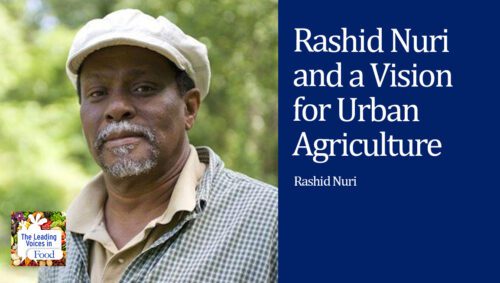 E123: Rashid Nuri and a Vision for Urban Agriculture
E123: Rashid Nuri and a Vision for Urban Agriculture